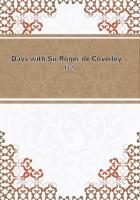The Advantages of an Air Raid The train was abominably late. It was due at eight-twenty-seven, but it was nearly ten when we reached St Pancras. I had resolved to go straight to my rooms in Westminster, buying on the way a cap and waterproof to conceal my uniform should anyone be near my door on my arrival. Then I would ring up Blenkiron and tell him all my adventures. I breakfasted at a coffee-stall, left my pack and rifle in the cloak-room, and walked out into the clear sunny morning.
I was feeling very pleased with myself. Looking back on my madcap journey, I seemed to have had an amazing run of luck and to be entitled to a little credit too. I told myself that persistence always pays and that nobody is beaten till he is dead. All Blenkiron's instructions had been faithfully carried out. I had found Ivery's post office. I had laid the lines of our own special communications with the enemy, and so far as I could see I had left no clue behind me. Ivery and Gresson took me for a well-meaning nincompoop. It was true that I had aroused profound suspicion in the breasts of the Scottish police. But that mattered nothing, for Cornelius Brand, the suspect, would presently disappear, and there was nothing against that rising soldier, Brigadier-General Richard Hannay, who would soon be on his way to France. After all this piece of service had not been so very unpleasant. I laughed when I remembered my grim forebodings in Gloucestershire. Bullivant had said it would be damnably risky in the long run, but here was the end and I had never been in danger of anything worse than ****** a fool of myself.
I remember that, as I made my way through Bloomsbury, I was not thinking so much of my triumphant report to Blenkiron as of my speedy return to the Front. Soon I would be with my beloved brigade again. I had missed Messines and the first part of Third Ypres, but the battle was still going on, and I had yet a chance. Imight get a division, for there had been talk of that before I left. Iknew the Army Commander thought a lot of me. But on the whole I hoped I would be left with the brigade. After all I was an ******* soldier, and I wasn't certain of my powers with a bigger command.
In Charing Cross Road I thought of Mary, and the brigade seemed suddenly less attractive. I hoped the war wouldn't last much longer, though with Russia heading straight for the devil Ididn't know how it was going to stop very soon. I was determined to see Mary before I left, and I had a good excuse, for I had taken my orders from her. The prospect entranced me, and I was mooning along in a happy dream, when I collided violently with in agitated citizen.
Then I realized that something very odd was happening.
There was a dull sound like the popping of the corks of flat soda-water bottles. There was a humming, too, from very far up in the skies. People in the street were either staring at the heavens or running wildly for shelter. A motor-bus in front of me emptied its contents in a twinkling; a taxi pulled up with a jar and the driver and fare dived into a second-hand bookshop. It took me a moment or two to realize the meaning of it all, and I had scarcely done this when I got a very practical proof. A hundred yards away a bomb fell on a street island, shivering every window-pane in a wide radius, and sending splinters of stone flying about my head. I did what I had done a hundred times before at the Front, and dropped flat on my face.
The man who says he doesn't mind being bombed or shelled is either a liar or a maniac. This London air raid seemed to me a singularly unpleasant business. I think it was the sight of the decent civilized life around one and the orderly streets, for what was perfectly natural in a rubble-heap like Ypres or Arras seemed an outrage here. I remember once being in billets in a Flanders village where I had the Maire's house and sat in a room upholstered in cut velvet, with wax flowers on the mantelpiece and oil paintings of three generations on the walls. The Boche took it into his head to shell the place with a long-range naval gun, and I simply loathed it.
It was horrible to have dust and splinters blown into that snug, homely room, whereas if I had been in a ruined barn I wouldn't have given the thing two thoughts. In the same way bombs dropping in central London seemed a grotesque indecency. I hated to see plump citizens with wild eyes, and nursemaids with scared children, and miserable women scuttling like rabbits in a warren.
The drone grew louder, and, looking up, I could see the enemy planes flying in a beautiful formation, very leisurely as it seemed, with all London at their mercy. Another bomb fell to the right, and presently bits of our own shrapnel were clattering viciously around me. I thought it about time to take cover, and ran shamelessly for the best place I could see, which was a Tube station. Five minutes before the street had been crowded; now I left behind me a desert dotted with one bus and three empty taxicabs.
I found the Tube entrance filled with excited humanity. One stout lady had fainted, and a nurse had become hysterical, but on the whole people were behaving well. Oddly enough they did not seem inclined to go down the stairs to the complete security of underground; but preferred rather to collect where they could still get a glimpse of the upper world, as if they were torn between fear of their lives and interest in the spectacle. That crowd gave me a good deal of respect for my countrymen. But several were badly rattled, and one man a little way off, whose back was turned, kept twitching his shoulders as if he had the colic.
I watched him curiously, and a movement of the crowd brought his face into profile. Then I gasped with amazement, for I saw that it was Ivery.
And yet it was not Ivery. There were the familiar nondescript features, the blandness, the plumpness, but all, so to speak, in ruins.















